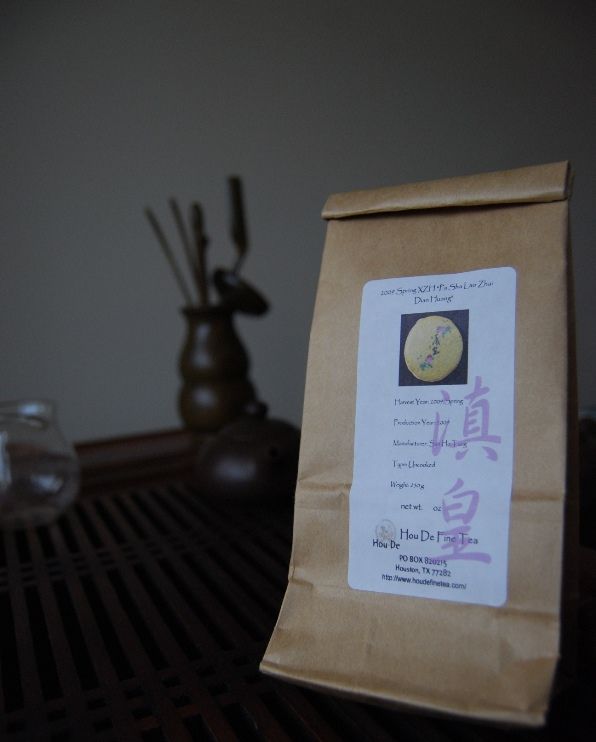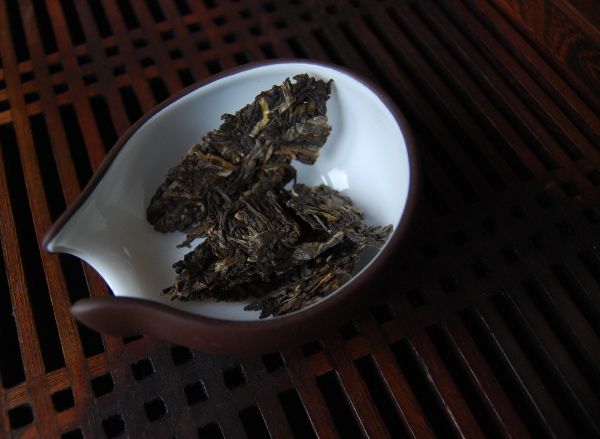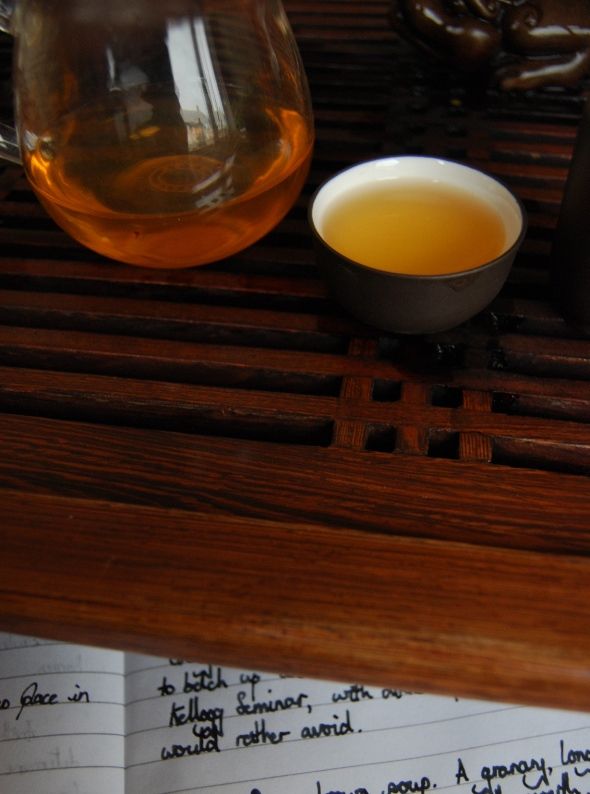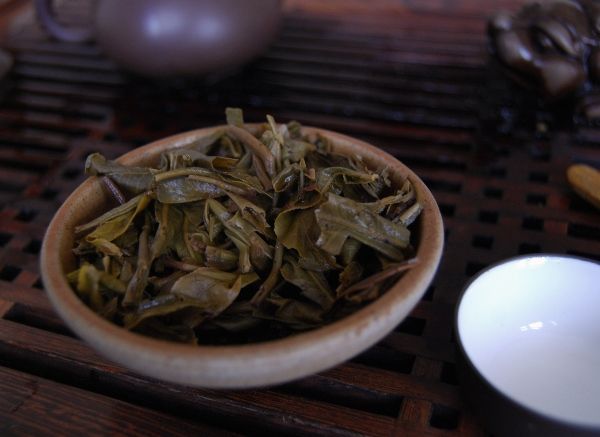I may have previously given the impression that I think Xizihao tea is for ladyboys.
Now don't get me wrong, while some of their productions are no doubt very popular with the transgender hospitality industry of Bangkok, there are a goodly number of "raw" Xizihao cakes out there.
They don't come much more raw than this cake from Pashashan (a.k.a. Mengpashashan).
Firstly, we need to unpack the typically mighty Xizihao name.
Pasha / Mengpasha is a mountain infrequently identified by pu'er producers. There was a 2006 Haiwan version of this mountain's leaves, which was one of the first teas that I bought in quantity. Funnily enough, I can remember the latter cake very clearly, even though I've not tried it since 2007. Taste memory is a strange thing. Everything I've ever had that's been associated with Mengpashashan has been Hardcore with a capital "H".
The "Laozhai" [laow-djai] part of the name simply means "old village". Xizihao are far too cool for the usual "zhengshan" [proper mountain].
Similarly, Xizihao are far too cool for the usual "chawang" [tea king], and so the final phrase of this cake's unwieldy name is "Dianhuang" [dee'an hwang], meaning "Yunnan Emperor". Brilliantly humble.
It's a pretty cake, which makes me concerned that we might need to file this under "ladyboy", but such worries are assuaged the minute that the pungent, rancorous, acrid stench of the leaves assaults my nostrils. In a good way.
This tea does not go quietly into the night.
Like the older Haiwan cake, this has a fat, uncompromised, savoury character. Also like the Haiwan cake, it is entirely powerful, and sits in the teacup shouting obscenities at me. I rather like it. This tea puts up a good fight.
But there can be only one.
I take a few hours off in the morning to teach this cake who's boss. It's a close-run battle, but it gives up before I do, after some 15 infusions.
Throughout, I am impressed by the fatness of its body, the chunkiness with which it dominates the mouth, and that acrid, tart, "Who's the daddy" kuwei that squats in the throat like an illegal tenant, and just won't leave.
Kudos to Sanhetang for making a sincere, unmonkeyed cake. Initial (intense) smokiness soon subsides, leaving a long, challenging tea.
This isn't one for the casual pu'ercha drinker - if you're a part-time sailor on the pu'ercha seas, then I'd recommend stable blends, or the sweet, gentle charms of the usual Yiwu / Laobanzhang / Nannuo / etc. ranges.
If, on the other hand, you're a grizzled old swine that fancies a bit of tea-table pugilism, then this is the tea for you.
N.B. this cake is no longer available at Houde, and so I have no idea of its cost. I wouldn't pay more than about $60-$75 for this, given its decent, but not entirely captivating, quality.
Addendum
March, 2014
I miss Old Houde. Back in the days of yore, Houde and Yunnan Sourcing were, more-or-less, the holders of most of the market-share for Western drinkers of pu'ercha. YS took the "low road", offering cheap-and-cheerful cakes, while Houde took the "high road", offering more rarified goods at higher prices. Looking back at my articles from that time, perhaps 2007 or so, the prices that I considered "high" are, ironically enough, actually lower than most prices today. If only my time machine were still working.
Due to the dominance of YS and Houde on the Western market, the latter's gratuitous mangling of pinyin (which only the English or Taiwanese peoples can really achieve to any degree of significance) led to Xizihao cakes being called "Xizhihao". This looks innocuous enough, but it completely changes the pronunciation from the elegant Mandarin of "shee-zzer-how" to the rather clunky and inelegant "shee-djur-hao". Hence, whenever I dig up these cakes, a mischievous part of my mind (i.e., the dominant fraction thereof) tells me that this is XIZHIHAO, in accordance with Houde's pinyin-mangling machine.
The fact that I have a sample from Houde that I have not yet finished this sample is quite a surprise: presumably, I paid for this sample, as I don't recall ever receiving samples gratis from Houde. This one must have snuck under my RADAR, and slipped into the depths of my tea-shelves unnoticed. Until today!
This tea from Mengpashashan is as robust in its scent as it was in 2011 - there is a good base of molasses to the lengxiang [cooling-scent]. Its thick body is adopting the spicy warmth of a strong cake that is descending into a somewhat aged state. Not all cakes go this particular way, but I am pleased when it happens.
This is strong tea in the Menghai (region) style, and very welcome. There is considerable activity on the tongue and a substantially cooling sensation that even affects the airway through the nose, such is its strength. This is a "big and bitter" tea; it has strength, but it could not be described as being tremendously entertaining, as the infusions wear on.
This is strong tea in the Menghai (region) style, and very welcome. There is considerable activity on the tongue and a substantially cooling sensation that even affects the airway through the nose, such is its strength. This is a "big and bitter" tea; it has strength, but it could not be described as being tremendously entertaining, as the infusions wear on.








I love these stories of battle.
ReplyDeleteNicolas
Pretty much on target for this tea, tho' I have found it to last about 10-12 rounds for me. It was $36/250g, so $72/proper bing.
ReplyDeleteI just tried a sample of Yuanshilin, which is supposed to be Pasha as well, and it pales in comparison to the 2009 Pasha. Wish I'd gotten a second. It was one or two people that just bought it all up.
An added note, I am surprised to find that so far, I am more impressed by the XZH 7542 than the 8582. Needs more testing. Much weaker flavor, but more genuinely elegant and powerful.
--shah8
Thanks, chaps.
ReplyDelete$72 for a bing equivalent isn't too bad - I wouldn't say no.
That said, it's not so amazing that I'm unhappy for not having one.
I haven't tried the Xizihao 7542/8582 for years - maybe it's time to revisit them.
Toodlepip,
Hobbes
Uuuhh - sounds like a "must try"!
ReplyDeleteThe other day I had White Dragon Factory's "Mo Zhen" Jing Gu Purple Needle Tea (2010). It came into the mouth fruity-sweet, only to follow with a mighty Ku. As if to apologize, some more sweetness and wonderful aroma when swallowing.
Reminded me of this post, although all in all it's probably much less aggressive - but maybe still interesting for you.
Martin
Thank you, Martin - I'm not sure if I've ever had a tea from that producer. May I ask where you found it? I rather like purple-leaf pu'ercha.
ReplyDeleteToodlepip,
Hobbes
Great pleasure, Hobbes!
ReplyDeleteThis one is from Yunnan Sourcing.
If you say you're fond of purple leaf - I don't know if you've seen, Scott also did a Yi Wu purple leaf cake last year.
Hope you're not doing too much pugilism on the this Sunday morning ...
Martin
Much obliged, sir - I've tried one or two purple-leaf cakes and bricks from YS, but nothing since 2008. I eagerly await my 2011 box of samples from Scott, which should be arriving soon. :)
ReplyDeleteToodlepip,
Hobbes